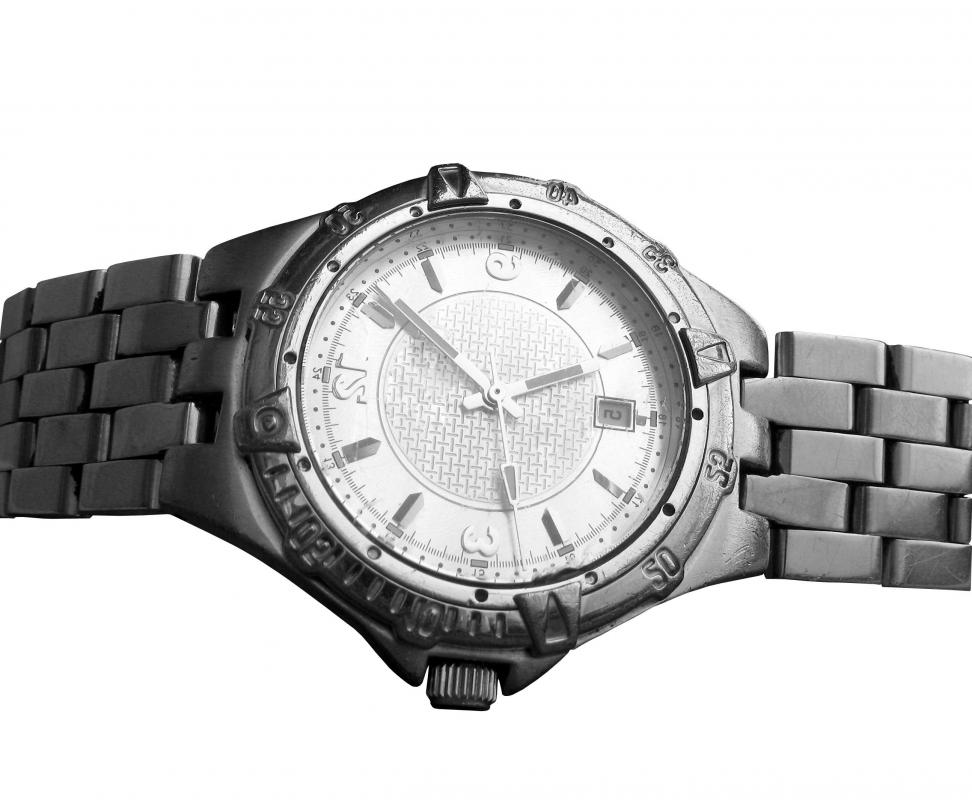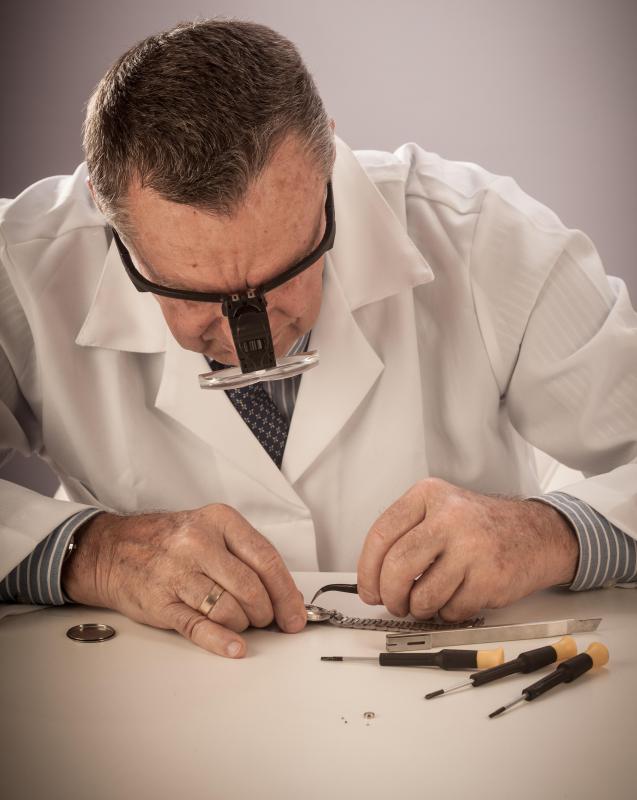At PracticalAdultInsights, we're committed to delivering accurate, trustworthy information. Our expert-authored content is rigorously fact-checked and sourced from credible authorities. Discover how we uphold the highest standards in providing you with reliable knowledge.
How Do I Become a Watchmaker?
If you want to become a watchmaker, then you should typically begin with a solid education in micromechanics and watchmaking in general. There are a number of different schools in different countries that offer programs in watchmaking, and these programs are often full-time courses that require two full years of study to complete. Once you have a degree or certification as a watchmaker, then you can look for opportunities to join the industry. You can potentially get work as a watchmaker at a company that designs and constructs watches, and there are numerous opportunities at jewelers and watch repair stores for a skilled watchmaker.
To become a watchmaker, you should typically first consider how you can learn what you need to know to professionally design or repair watches. You might begin your study by looking for local hobby clubs or groups of watchmakers, or horologists, to help you begin to learn the terminology and theory behind watch design. These clubs are often quite welcoming to new members, and you can begin to develop contacts within the high-end watch industry through such groups. To become a professional watchmaker, however, you typically need more in-depth training, such as from an accredited school that offers a program in watchmaking.

Different schools offer different types of programs to help you become a watchmaker, though most programs should be accredited by a reputable association of watchmakers. These programs often take two years to complete, usually requiring full-time attendance and a serious commitment. At the end of these two years, you can also take other courses to receive an associate’s degree, or simply gain certification from the school. You might also consider certification through companies that produce watches, such as Rolex® or Omega® to better qualify you to work on their watches.

If you are very fortunate, you may be able to find an established master watchmaker who is willing to take you on as an apprentice to help you become a watchmaker. This type of opportunity has become increasingly rare, however, and you may be able to more easily enroll at a school with an established watchmaking program. Once you have your certification or degree, then you can look for various businesses in need of a watchmaker.
AS FEATURED ON:
AS FEATURED ON:














Discussion Comments
@Charred - Actually I don’t know if the process is completely automated. I can tell you that high end Swiss watches are made by hands, in a lab, with a team of workers.
These watches are made with hundreds of moving pieces and are made with care and craftsmanship. I suppose that’s the reason that they cost so much, in addition of course to the price of the gold being used to make the watch.
I think these high end watches are like the Rolls Royce automobiles of the watch making world.
I had absolutely no idea that you could become a watchmaker in the traditional sense of the term anymore. I thought the watchmaker job had been a thing of the past and that nowadays most watches were made by assembly line methods.
I understand the concept behind repairing watches – this is not an automated process; actual hands have to touch the watch to clean it and repair it. However the actual construction of watches is an engineering process that I believe is largely automated.
At any rate this sounds like it would be an interesting job for someone who is a jeweler or who has a keen eye for detail. You will be working with precision instruments at a very miniature scale so you will need to be very delicate and have a lot of patience I would think.
My son worked as a salesman at a jewelry store for a few years. Sales really isn't his thing, but he did become interested in repairing watches and the theory behind how they work.
Ever since then he has thought about pursuing some kind of watchmaker training, but has never done it yet.
Does anybody know if any of the home watchmaking courses they offer online would be a good place to start? If you are going to be investing the time and money into something like this, I would want to make sure it was a good program.
I told him if he was looking at a home training program, to make sure the program was accredited. Sometimes it is hard to know if something like that is trustworthy or not.
While I have had watches repaired several times, I have never given much thought to who actually makes and designs all the watches.
If someone works at a jewelry store repairing watches, have most of them completed a watchmaker training course?
I would think the watches that are in most of the jewelry stores would be made and designed by someone else, and they are just selling them.
On the other hand, if you know how to repair a watch, you would probably know how to make them too. I have never seen the option to have a customized watch made for you at the jewelry stores I have been to.
@honeybees - I can't speak for most people, but I have a cousin who ended up being a watchmaker. He was one of those kids who was always tearing things apart and putting them back together again.
I don't know how he specifically became interested in watches, but when he found out there where watchmaking classes where he could get accredited, that is what he pursued.
This is something that came naturally for him, and now he works for one of the reputable, high-end watch companies.
He can repair just about anything, but he really loves designing and making different styles of watches. The fun part of this for us is that we have received some unique watches as gifts for special occasions.
There is a small watch shop around the corner from my house that has been there for as long as I can remember.
The man who started this shop was young the first time I stopped in and he raised his kids there in the shop with him. From the time they were little until they were old enough to start helping out in the shop, they were always with him.
Now one of the sons helps run the watch business with his dad. They are really good at what they do and they have always been able to repair anything I have left for them.
They don't do a lot of design work, but my husband did have them make a custom watch for himself. I think the son is more interested in this aspect of the business than the repair part. I can see him expanding this part of the business in the future.
In a situation like this, it is easy to see how the son became involved with watchmaking. I have always been curious how others who were interested in becoming a watchmaker were introduced to this skill.
Post your comments